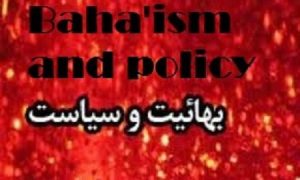The Baha’ism leaders have constantly emphasized on the separation of religion and policy. They are always insisting on the lack of bond between Baha’ism and the policy world. Abbas Effendi believed in the separation between religion and policy as necessity. “He has also said: “The criterion for being Baha’i or not is that a person who meddles with policy and speaks out of his/her duty, this proof is adequate for him/her not to be a Baha’i. It doesn’t need any other reason.” He has also said: “The Baha’is don’t belong to political affairs.”
Those who have issued the above-mentioned commandment have denounced the Iranian scholars due to their interference in policy and claimed for the presence of Shia scholars in policy scene during several recent centuries to cause numerous damages against the community and the country.
Confessed by history, the Baha’i leaders have issued the commandment of separation between religion and policy just for the Islamic scholars not themselves. They have been and are totally active in policy scene.
The following cases are of the Baha’is numerous involvements in political affairs and wars:
- Being happy with the victory to Tel Aviv in 6-day war dated June 1967 A.D. (Khordad, 1346 S.H.). During the war, the Baha’is supported Israel contrary to their slogan of “the universal peace” instead of denouncing the Zionists as aggressive and the initiator of war. At that time, the Baha’is collected 120 million Tumans to be sent to Haifa, the universal house of justice to help the Israeli army, according to SAVAK documents.
- On October 1973 A.D., the army of the Islamic countries attacked the Zionists to retake their lands. The Egyptian troops passed the Suez Canal quickly and passed the great wall of Barlow which was catted unconquerable by the Zionists. In other fronts, Syria and Jordan chastened the Zionists. In this situation, the Baha’i press ran about and campaign against war and destructions.






